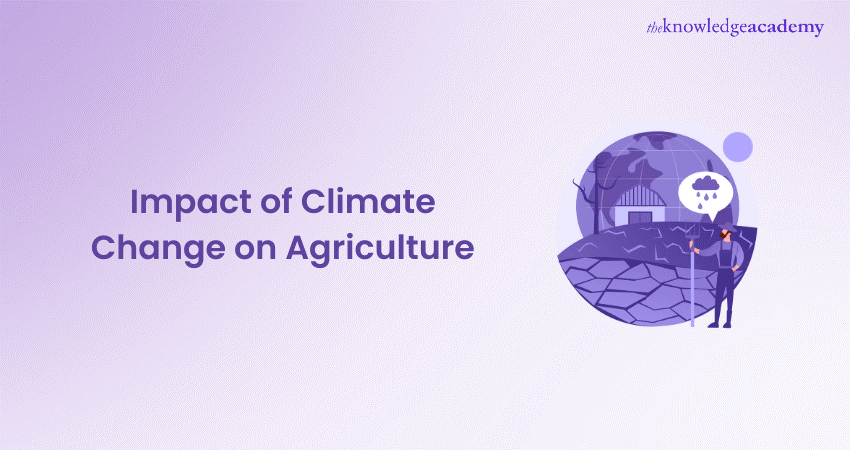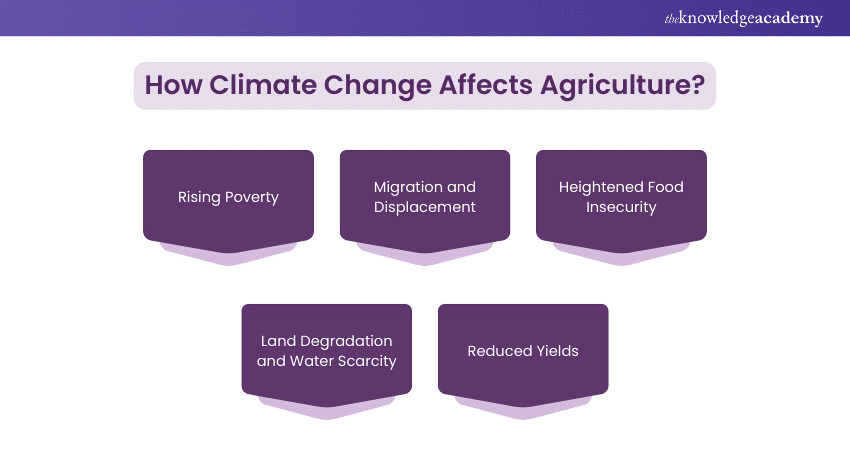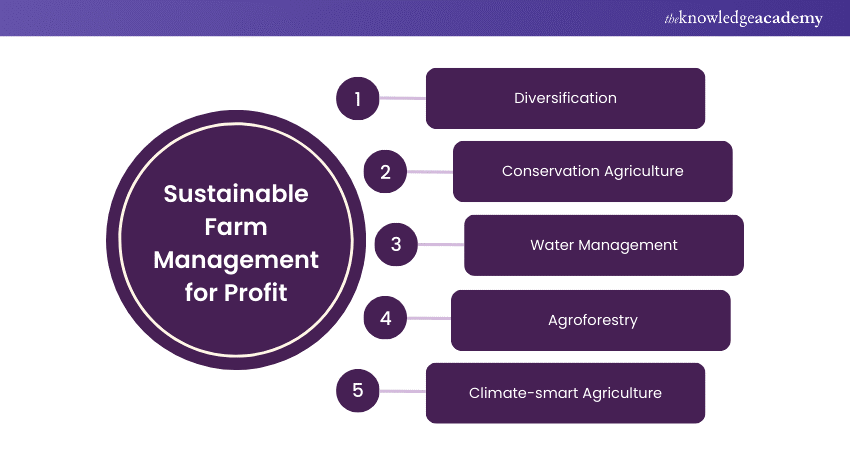We may not have the course you’re looking for. If you enquire or give us a call on +44 1344 203 999 and speak to our training experts, we may still be able to help with your training requirements.
Training Outcomes Within Your Budget!
We ensure quality, budget-alignment, and timely delivery by our expert instructors.

The Impact of Climate Change on Agriculture is one of the most pressing issues facing our world today. Farmers worldwide are struggling with unpredictable weather, extreme temperatures, and shifting growing seasons. But what exactly does this mean for the food we eat and the livelihoods of millions of people? How do these changes translate into everyday challenges for those working the land?
In this blog, we explore farmer adaptations and healthy practices to mitigate the effects of climate change on agriculture. By understanding the profound connection between climate change and agriculture, we can work towards a more resilient agricultural system. Read this blog on Impact of Climate Change on Agriculture to discover how we can secure a sustainable future for agriculture and the countless lives it supports.
Table of Contents
1) The Connection Between Agriculture and Climate Change
2) How Climate Change Affects Agriculture?
3) Farm Management Solution for Sustainability & Profitability
4) Agriculture's Role in the Economy
5) The Future of Agriculture in a Changing Climate
6) Conclusion
The Connection Between Agriculture and Climate Change
Agriculture and climate change are intrinsically linked, forming a complex relationship where each significantly impacts the other. Agricultural activities contribute to climate change through the release of Greenhouse Gases like methane and nitrous oxide from livestock and fertiliser use.
Conversely, climate change affects agricultural productivity and sustainability. This interplay makes understanding their connection important for building effective strategies to mitigate climate change and ensure food security.
How Climate Change Affects Agriculture?
Climate change poses various challenges to agriculture, impacting not only the environment but also the socioeconomic aspects of farming communities. Here, we explore some of the major effects:

1) Rising Poverty
a) Hurricanes, droughts, and other extreme weather disasters damage infrastructure and agriculture.
b) Reduced farmer incomes as a result of lost infrastructure and crops.
c) Farmers get caught in a cycle of poverty when severe incidents occur more frequently.
d) Farmers who are smallholders who depend on rain-fed agriculture are particularly at risk.
2) Migration and Displacement
a) The adverse effects of climate change force farming families to migrate.
b) Arable land becomes less productive or uninhabitable due to rising sea levels and extreme weather.
c) Migration leads to increased urbanisation, straining city resources.
d) Socioeconomic challenges arise in both rural and urban areas due to displacement.
3) Heightened Food Insecurity
a) Variations in temperature and precipitation patterns disrupt crop growth cycles.
b) Reduced yields and altered food availability due to climate change.
c) Pests and diseases thrive in warmer climates, threatening food production.
d) Regions already vulnerable to food insecurity face greater challenges in meeting nutritional needs.
4) Land Degradation and Water Scarcity
a) Climate change accelerates land degradation and water scarcity.
b) Increased temperatures and erratic rainfall lead to soil erosion and desertification.
c) Depletion of water resources critical for agricultural productivity.
d) Crop failures and livestock suffering due to inadequate water.
e) Sustainable land and water management practices are important to combat these issues.
5) Reduced Yields
a) Changing climatic conditions have a direct impact on crop productivity.
b) Extreme weather conditions (heatwaves, lengthy droughts) harm crops, lowering growth and yield.
c) Lower yields are caused by changes in growing seasons, as well as the arrival of novel diseases and pests.
4) Reduced yields have an influence on food availability and the economic stability of agricultural regions.
Master ISO 14001 auditing skills with expert-led ISO 14001 Internal Auditor Training – sign up today!
Farm Management Solution for Sustainability & Profitability
To fight the challenges created by climate change, farmers need to adopt sustainable and profitable farm management solutions. These include:

1) Diversification: Growing a variety of crops and raising different types of livestock can reduce the risk of total loss due to climate events.
2) Conservation Agriculture: Practices like minimal tillage, crop rotation, and cover cropping are essential for maintaining soil health and enhancing resilience to climate change.
3) Water Management: Efficient irrigation systems and rainwater harvesting can help mitigate water scarcity.
4) Agroforestry: Integrating trees into agricultural systems can enhance biodiversity, improve soil structure, and provide additional income sources.
5) Climate-smart Agriculture: Using technology and data for informed decisions on planting, harvesting, and resource management boosts efficiency and reduces environmental impact.
Excel in ISO 14001 Lead Implementer Course –register now and lead environmental management initiatives effectively!
Agriculture's Role in the Economy
Agriculture is a key component of many economies, particularly in underdeveloped countries. It creates jobs, supports livelihoods, and adds to the national GDP. However, the sector's sensitivity to climate change threatens economic stability.
Maintaining agriculture's sustainability thus becomes essential not only for food security, but also for economic resilience. Investing in agricultural research, infrastructure, and regulation that encourages sustainable practices can help to secure the sector's future.
Gain expertise in ISO 14001 Lead Auditor Course - register now and become a Certified Lead Auditor!
The Future of Agriculture in a Changing Climate
The future of agriculture in the face of climate change hinges on our ability to adapt and innovate. Here are some key areas of focus:
1) Key Challenges and Adaptations
a) Changing Weather Patterns: Weather fluctuations can cause crop failure and lower yields. To reduce these risks, farmers will need to grow climate-resilient crops and change their planting schedules.
b) Water Scarcity: As droughts and water shortages become more common, effective water management strategies such as drip irrigation and rainwater harvesting will be essential.
c) Soil Health: Soil degradation caused by improper use and climate change can affect agricultural production. Crop rotation, cover cropping, and reduced ploughing are all practices that can help to keep soil healthy.
d) Greenhouse Gas Emissions: Agriculture produces a significant quantity of greenhouse gas emissions. Implementing sustainable methods like precision farming, using less chemical fertilizer, and incorporating agroforestry can all assist to minimize emissions.
2) Technological Innovations
a) Climate-smart Agriculture: This method combines several technology and practices to increase productivity while lowering greenhouse gas emissions. It entails the use of drought-tolerant crops, effective irrigation systems, and better soil management practices.
b) Digital Agriculture: Technologies like remote sensing, IoT, and AI can provide real-time data to help farmers make informed decisions. These tools can optimise resource use, improve crop management, and enhance overall farm efficiency.
c) Alternative Proteins: Using a plant-based and lab-grown proteins can greatly reduce the environmental impact of livestock husbandry. This transformation has the potential to open up new markets and increase value for farmers.
3) Global Efforts and Policies
a) International Collaboration: Global initiatives and partnerships are crucial for sharing knowledge, resources, and technologies to combat climate change impacts on agriculture.
b) Policy Support: Governments need to implement policies that support sustainable farming practices, provide financial incentives for adopting green technologies, and ensure food security for vulnerable populations.
Begin your ISO 14001 Foundation Certification Training today and enhance your Environmental Management skills!
Conclusion
The Impact of Climate Change on Agriculture demands immediate and innovative solutions. By embracing sustainable practices and cutting-edge technologies, we can turn challenges into opportunities. Let’s work together to cultivate a resilient future for agriculture, ensuring food security and economic stability for generations to come.
Join our ISO 14001 Certification Training to make a positive environmental impact!
Frequently Asked Questions

Agriculture and weather are intricately connected, with weather patterns significantly influencing crop growth, yield, and health. Variations in rainfall, temperature, and extreme weather events directly affect agricultural productivity and sustainability.

Crop failure significantly impacts farmers by diminishing their income, escalating debt, and jeopardizing their livelihoods. It can result in food insecurity, loss of investment, and prolonged economic instability for farming communities.

The Knowledge Academy takes global learning to new heights, offering over 30,000 online courses across 490+ locations in 220 countries. This expansive reach ensures accessibility and convenience for learners worldwide.
Alongside our diverse Online Course Catalogue, encompassing 17 major categories, we go the extra mile by providing a plethora of free educational Online Resources like News updates, Blogs, videos, webinars, and interview questions. Tailoring learning experiences further, professionals can maximise value with customisable Course Bundles of TKA.

The Knowledge Academy’s Knowledge Pass, a prepaid voucher, adds another layer of flexibility, allowing course bookings over a 12-month period. Join us on a journey where education knows no bounds.

The Knowledge Academy offers various ISO 14097 Training, including ISO 14097 Greenhouse Gas Management Training. This course caters to different skill levels, providing comprehensive insights into Environmental Aspects and Impacts Register.
Our Health & Safety Blogs cover a range of topics related to Greenhouse Effect, offering valuable resources, best practices, and industry insights. Whether you are a beginner or looking to advance your Health and Safety skills, The Knowledge Academy's diverse courses and informative blogs have got you covered.







 Top Rated Course
Top Rated Course




 If you wish to make any changes to your course, please
If you wish to make any changes to your course, please


